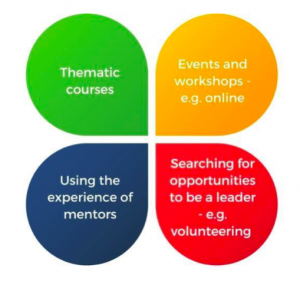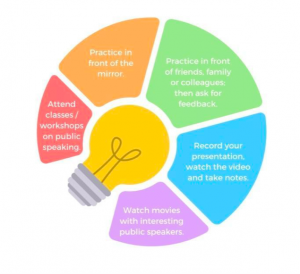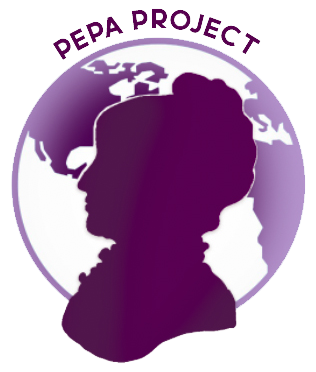Module 6
LOOKING FOR A JOB
How to apply for a job? Workplace and entrepreneurial skills. Leadership. Self- and public presentation. Writing a strong CV
Introduction
Decision to live outside a home country is a challenge. Migrant women experience all the difficulties faced by women in the labor market. However, they also carry the burden of migration.
Migrant women face the hardships of adapting, getting a job, understanding the legal and administrative complexities, adapting to socio-cultural differences, overcoming the language barrier, building a network of contacts and establishing relationships.
This module provides information to instruct migrant woman on how to become more confident on labor market.
The practical content will be useful in building greater awareness of the competences of migrant women as potential employees.
Our aim is to encourage women to delve into this concept and provide useful references.
Objectives
- to instruct migrant women on how to apply for a job effectively,
- to know the importance of competences like: workplace and entrepreneurial skills, leadership, self- and public presentation,
- define the most important elements of a strong and valuable resume.
Duration & Requirements
Approximate reading time for the module, without taking into account the suggested resources and further reading, is about 3 hours.
The learners don’t need to already have particular knowledge or skills. The learners will need a computer with an internet connection and sheet of paper and a pen to take notes.
It is advisable that the learners consults the reference material and thus deepen the information provided.
Content
In all EU countries, women’s share in the labor market is lower than men. Women tend to work fewer hours in lower-paid sectors and work on lower positions than men. The consequence is the gender pay gap, as mentioned in module 5.
Migrant women experience more problems in the labor market. Making the decision to live in a foreign country is a challenge. They face some challenges related to adaptation, getting a job, legal and administrative problems, adapting to socio-cultural differences, overcoming the language barrier and building a network of contacts and establishing new relationships. Many migrant and refugee women do low-skilled jobs.
The difficulties in the labor market include:

Migrant women put a tremendous effort into their development. Their professional success means overcoming many barriers:
internal (lack of self-confidence, lack of faith in your language skills and abilities), social (traditional role of women, patriarchal family pattern), mental (stereotypical opinions about the functioning of women).
I How to apply for a job?
Every migrant woman who wants to work legally should get acquainted with the necessary requirements in detail. Each country has different legal regulations that must be followed. It is worth looking for institutions that run information points and non-governmental organizations that implement various programs supporting migrants.
Joining a support network for migrant women may facilitate tackling the first difficulties at the linguistic and administrative level (legalization of stay, work permit, recognition of diplomas). It can also help them find childcare facilities.
The regulated legal and administrative situation fosters applying for a job and further existence in the workplace.
Insufficient command of the language and knowledge of socio-economic reality of a country the women are residing in is often related to a decline in their self-esteem. However, the right support and determination can help rebuild faith in their own abilities. Sometimes doing even low-skilled jobs can help master language skills and get to know the reality of the "new" country. It also helps to face new challenges.
It is worth building your image as a responsible employee from the very beginning.
An important stage to successfully start the recruitment process is to verify one’s own social media through modifying privacy settings – only some neutral and well-perceived information should be visible. Also, potential employees should avoid a fanpage that could discredit them.
Here are a few important tips:
- Search for a job in your field. The Internet gives you a wide range of job search opportunities - you can search for offers on the websites of the companies you plan to apply for a given position or on any websites that publish job advertisements.
- Analyze the company you want to send your application to - you will find all relevant information on the company's website. It is also worth looking for information and articles using the Internet search engine.
- The next step is to submit your CV (usually online). This is a formal document given to a potential employer that summarizes your actual education and experience. It is worth paying attention to updating your CV in terms of the job you are applying for. It is important to add the latest education, experience and skills.
- A cover letter may be required in the recruitment process, but it is not always expected. If you decide to send a cover letter, take care of its quality, adapt it to the description of the company and position. The cover letter complements the CV and may provide interesting information to the recipient. Remember to emphasize your strengths.
Most often, after preparing your CV and possibly a cover letter, you should send them by completing the online form. It is worth doing it carefully. Answer each question thoughtfully and adapt your answer to the company's needs.
If you want to check if your CV has been delivered or at what stage the recruitment process is, you can contact the company. However, it is worth waiting for about 2 weeks after sending your CV, not to be intrusive or perceived that way.
- The next stage will probably be a job interview you should be prepared for properly. The first step, if you haven't done it at the stage of CV writing, is to understand the company's activity - its goals, what exactly it deals with, what products or services it provides, and how many employees it has. It is also worth looking for information about the person who will interview you. Follow their career path and interests. The more information you get, the more confident you will feel during your interview.
- Seek the most common recruitment questions for a given position. Many conversations are based on the questions about key competences. The recruiter selects the most important qualifications for verification, e.g. group work, result orientation, coping with mistakes, and during the interview the candidate must demonstrate that they have a given competence or skill, giving real examples from their own experience.
The most important thing while preparing for a job interview is to know your CV content. Remember! Try to be honest, trustworthy and reliable. It is not worth perverting facts.
Workplace and entrepreneurial skills. Leadership
Entrepreneurial skills can be applied to a wide variety of jobs and fields. Entrepreneurial skills consist of a wide range of competences: technical skills, leadership and business management skills, creative thinking and communication skills.
Leadership is the art of motivating a group of people to work towards a common goal. The elements of leadership are skills and preparation to inspire others. Effective leadership is based on working with people so as to encourage them to act in accordance with the leader’s expectations. The leader pushes others to act, at the same time guiding them.
Leadership qualities are seen as natural abilities, however, anyone can try to develop their leadership skills by common improvement of these abilities. Leadership goes far beyond managerial responsibilities.
How to work on developing entrepreneurial and leadership skills?

There are many different methods you can use to develop your entrepreneurial and leadership skills:
Self- and public presentation
Candidates with good presentation skills are valuable in many professions. It is a skill that is often used in team work and helps during a job interview, but above of all, once you get a job.
This is a soft, interpersonal skill that combines many aspects of communication skills - including making contact with interlocutors. It is an important competence from an employer's perspective, because presentations, trainings and speeches are quite common on many positions.
Highlighting your presentation skills during a job interview should show which aspects of the speeches you are good at by giving specific examples, for example if you made public presentations or internal presentations in a previous job.
Important elements of public speaking are:
- Clear articulation
- Inviting presentation style (voice tone, body language, facial expression)
- Assessment of recipients' needs - adjusting the style of speech to the recipients
- Knowledge of useful presentation software i.a: PowerPoint, Prezi, Canva, etc.
- Speech flow and oratory skills (incl. stamina, charisma, confidence, empathy, communication)
- Other public speaking skills: controlling your stress, attracting the audience's attention with an interesting introduction, maintaining eye contact with your audience, improvising/ getting out of your head, gathering feedback, and drawing conclusions for your next speeches.
If you are unsure about presentation issues, you can work on developing these skills:

Writing a strong CV
Creating a CV does not aim to describe your life story. When creating it, focus on the fact that it is a form of marketing offer that sums up your experience, skills and education. Try to convince the recipient/ your potential employer that you are the best candidate for the selected position.
As we wrote above, adjust your CV to the requirements of the job you are applying for: add the latest education, experience and skills. In the chronological order, the most recent education and experience should be listed first in each section.
CV should not be extensive – no longer than 2 pages. If you want to write more about yourself, you can use a cover letter, which gives you more opportunities to present your strengths.
You can use many free-of-charge programs to create a CV - they will help maintain a clear and aesthetic structure of the document. Pay special attention to checking errors. It is easy to overlook a spelling and/ or grammar mistake. If you are not sure if it is correct - ask a trusted person to read the document before sending it. Also, remember to carefully check your contact details. Being meticulous at this stage may pay a lot.
Please read the job description you want to apply for carefully. Remember about the keywords from the job offer - include them in your CV if they match your skills. When creating your CV, remember that you do not have to be 100% suitable for the position. If there are areas where you are not that strong, highlight any other skills that are desired on this post.
Interests are also essential in your CV. It is not worth ignoring them. Avoid being vague - focus on those interests that may fit into the corporate culture of the company.
If there are gaps in your CV, you can complete them with any volunteer work at this time, if possible. This will prove that you moved forward and made attempts to develop, for example, soft skills.
Summary
In this chapter, we present basic information on the problems of migrant women in the labor market, applying for a job, competences that are valuable in the labor market and creating an interesting CV. We also provide practical tips that can help migrant women develop themselves. The collected information can be a starting point for further searching for opportunities for self-development.
Learning Outcomes
By the end of this module you will be able to:
- plan your own steps to apply for a job,
- indicate what workplace, entrepreneurial and leadership skills are all about,
- strengthen the ability of self- and public presentation,
- create your own and valuable CV.
Self-assessment
Suggested resources
- How to Apply for a Job in 6 Easy and Effective Steps;
https://www.indeed.com/career-advice/finding-a-job/applying-for-a-job
- WORKEEN - A Game for EU Labour Markets Integration
https://play.google.com/store/apps/details?id=eu.sirius.workeen&hl=pl&gl=US
References
- https://www.indeed.com/career-advice/finding-a-job/applying-for-a-job
- https://interviewme.pl/blog/pokonaj-pytania-na-rozmowie-kwalifikacyjnej
- https://ec.europa.eu/info/sites/default/files/file_import/european-semester_thematic-factsheet_labour-force-participation-women_pl.pdf
- https://www.thebalancesmb.com/leadership-definition-2948275
- https://www.mindtools.com/pages/article/newCDV_76.htm
- Important Public Speaking Skills for Workplace Success by Alison Doyle
https://www.thebalancecareers.com/public-speaking-skills-with-examples-2059697
